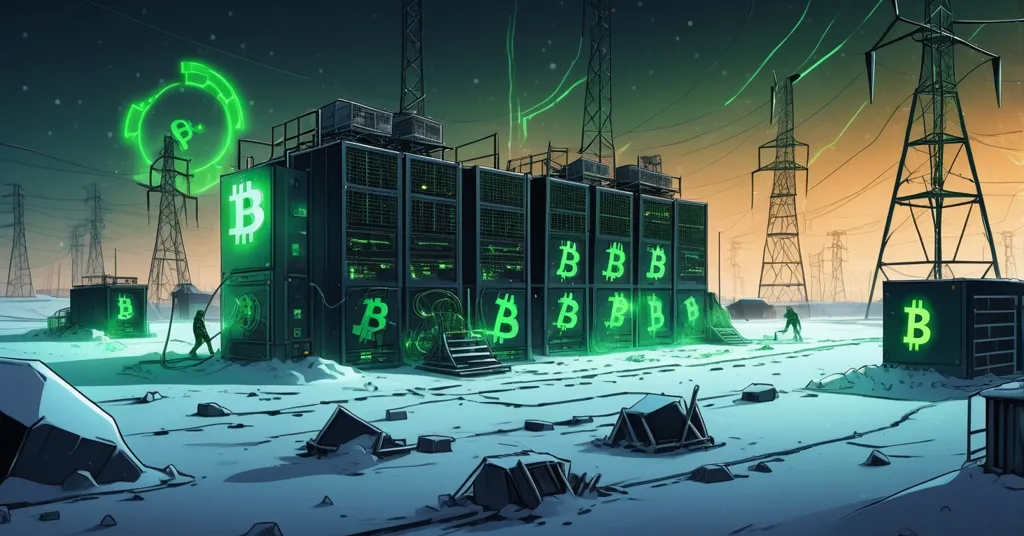Kazakhstan Busts $16M Crypto Mining Theft, Exposing Bitcoin Energy Wars

Kazakhstan Crushes $16 Million Crypto Mining Power Theft in Bold Crackdown
Kazakhstan has unleashed a fierce crackdown on an illegal cryptocurrency mining operation, exposing a staggering $16.5 million electricity theft scheme that’s rocked East Kazakhstan Oblast. This bust, executed by the Financial Monitoring Agency (AFM) and National Security Committee (KNB), isn’t just a local takedown—it’s a screaming wake-up call about the energy wars Bitcoin mining is igniting worldwide, pitting decentralized ideals against the hard realities of state-controlled resources.
- Massive Heist Busted: Over $16.5 million (9 billion Kazakhstani tenge) in electricity stolen over two years.
- Energy Drain: Miners guzzled more than 50 megawatt-hours, enough to power a city of 50,000-70,000 people.
- State Retaliation: Assets like apartments and vehicles seized as regulations tighten.
Energy Theft: Breaking Down the Numbers
In the rugged expanse of East Kazakhstan Oblast, authorities dismantled a crypto mining operation that didn’t just bend the rules—it obliterated them with industrial-scale audacity. Over two years, these rogue miners siphoned off electricity worth more than $16.5 million, or 9 billion Kazakhstani tenge, through a shady alliance with corrupt local utility workers. These insiders diverted power meant for vital public services—hospitals, schools, and strategic facilities—directly to mining farms. The scale is mind-blowing: over 50 megawatt-hours (MWh) of energy consumed, a volume equivalent to the needs of a small city housing 50,000 to 70,000 residents. To put that in perspective, a megawatt-hour represents one million watts of power used for an hour, and 50 MWh is the kind of consumption that can grind a regional grid to a halt if unchecked, as seen in reports of Kazakhstan’s massive crypto mining power theft bust.
The AFM and KNB didn’t stop at shutting down the rigs. They targeted the profits, seizing two apartments in the capital and four vehicles bought with dirty money. A court order for full confiscation is in the works, hammering home a brutal message: steal power for crypto, and you’ll lose everything you gained.
“The organizers used the criminal proceeds to purchase two apartments in the capital and four vehicles, which were seized with a court order for potential confiscation.”
From Haven to Hardline: Kazakhstan’s Mining Saga
Let’s rewind to understand why Kazakhstan became the epicenter of this mess. In 2021, when China dropped a nuclear ban on all crypto activities, including Bitcoin mining, displaced miners swarmed to Kazakhstan like prospectors to a gold rush. Cheap, often coal-fueled electricity and a seemingly open-door policy made it a paradise. At its zenith, the country commanded nearly 18% of the global Bitcoin hashrate—the collective computational muscle securing the Bitcoin network through proof-of-work (PoW). For the uninitiated, PoW is Bitcoin’s consensus mechanism, where miners use specialized hardware called ASICs (think of them as race cars built only for speed, insanely powerful but energy-thirsty) to solve complex puzzles, validating transactions and earning BTC rewards. This influx, however, strained resources significantly, as detailed in studies on the impact of China’s 2021 Bitcoin mining ban on Kazakhstan’s energy grid.
But paradise turned to pandemonium. The mining boom overwhelmed Kazakhstan’s aging energy grid, triggering blackouts and shortages that left entire communities—think schools without lights or hospitals on backup generators—in the dark. By 2022, the government flipped the script. Here’s the timeline: 2019, miners welcomed; 2021, grid buckles under strain; 2022, new taxes and strict caps emerge; 2023, busts like this signal zero tolerance. Today, mining farms are legally bound to buy power through a state-run platform under the Ministry of Energy, limited to a measly 1 MWh per transaction—peanuts for industrial operations needing tenfold that to keep rigs humming. This theft bust proves some miners would rather risk prison than play by these suffocating Kazakhstan cryptocurrency mining regulations in 2023.
Global Mining Tug-of-War
Kazakhstan’s struggle isn’t a solo act—it’s part of a worldwide chess match where nations wrestle with crypto’s energy conundrum. Take Russia: they’re rolling out hardware registries and issuing stern warnings to curb illegal mining, mirroring Kazakhstan’s iron grip. Flip the board to France, and you’ve got a wild contrast. The far-right Rassemblement National party is pitching a plan to repurpose surplus nuclear power for Bitcoin mining, arguing it boosts “economic sovereignty” while tackling energy waste. Picture a French nuclear plant humming with mining rigs while locals debate if it’s brilliance or insanity—meanwhile, Kazakhstan’s miners are literally lights-out, as explored in this analysis of France’s nuclear power Bitcoin mining proposal. These clashing approaches highlight a split: crack down hard or innovate through integration? Neither side has cracked the code yet on balancing blockchain’s potential with grid stability.
Proof-of-Work: Freedom at a Cost
Zooming in on Bitcoin itself, the stakes couldn’t be clearer. When this bust hit the news, BTC was reportedly trading at $120,260 (though let’s be real, current prices as of late 2023 hover around $60,000-$70,000, a reminder of this market’s wild swings). Each block reward—now 3.125 BTC after the 2024 halving—is a jackpot worth fighting for. A halving, by the way, is Bitcoin’s built-in scarcity trigger, slashing mining rewards roughly every four years to mimic gold’s rarity. It’s why miners race against rising difficulty and costs, sometimes diving into dark alleys like power theft. But it’s not just greed; it’s survival in a game where legal mining gets choked by red tape. Discussions around such issues often surface in community forums like this Reddit thread on Kazakhstan crypto mining power theft.
As Bitcoin maximalists, we’ll stand by proof-of-work as the Fort Knox of blockchains—its energy-intensive grind ensures unmatched security and decentralization no altcoin can touch. Yet, we can’t ignore the flak PoW gets for its environmental footprint. Ethereum’s 2022 shift to proof-of-stake, which sips power compared to Bitcoin’s chug, has maximalists scoffing but secretly eyeing those lower electric bills. Altcoins fill niches, no doubt, but BTC’s robustness remains the hill we die on—energy costs be damned, or at least until smarter solutions for Bitcoin’s proof-of-work energy consumption emerge.
Future Fixes: Can Mining Go Green?
This bust isn’t just a headline; it’s a neon sign flashing Bitcoin mining’s unsustainable hunger. So, what’s the fix? Off-grid renewables are one path—Iceland’s geothermal-powered farms and Canada’s hydro setups show mining without grid chaos is possible. Closer to home, Texas miners are tapping flared natural gas, turning waste into watts. Could Kazakhstan pivot to something similar, harnessing its vast wind potential in the steppes? Or imagine a wilder idea: decentralized energy markets on blockchain, where power is traded peer-to-peer, no utility middlemen needed, much like Bitcoin ditches banks. It’s untested, sure, but worth a hard look, especially when considering broader impacts of Bitcoin mining on energy grids.
Here’s the devil’s advocate twist: heavy-handed crackdowns like Kazakhstan’s might backfire, driving miners deeper underground into black-market power deals rather than fostering innovation. Why not incentivize green mining with tax breaks or surplus energy deals instead of just swinging the ban hammer? Post-2021, Kazakhstan’s global hashrate share plummeted from 18% to around 5-6% (per Cambridge Bitcoin Electricity Consumption Index estimates), redistributing power to places like the U.S. But if every nation plays hardball, where do miners go next? The conflict won’t vanish without systemic change—freedom through decentralization demands ingenuity, not just punishment. For a deeper dive into the context, check this Wikipedia overview on cryptocurrency mining issues in Kazakhstan.
Key Takeaways and Burning Questions
- Why did Kazakhstan shift from mining haven to regulatory enforcer?
The 2021 influx after China’s ban crushed the grid with blackouts, forcing strict rules like taxes and caps to prioritize energy stability, evident in this $16.5 million theft bust. - How massive was the energy theft by these illegal miners?
Over 50 megawatt-hours, enough to sustain a city of 50,000-70,000 people, exposing the colossal energy appetite of Bitcoin mining. - How has Kazakhstan’s Bitcoin hashrate changed since its peak?
Dropping from 18% of global hashrate in 2021 to about 5-6% by 2023, reflecting crackdowns pushing miners elsewhere, reshaping Bitcoin’s global power map. - What’s the global split on handling mining energy challenges?
Nations are divided—Russia mirrors Kazakhstan with tight control via hardware registries, while France explores nuclear-powered mining, showing a clash between restriction and innovation. - Are such crackdowns a threat to crypto’s decentralized ethos?
Potentially—they stop bad actors but risk overreach; without balanced policies or sustainable energy solutions, innovation could stall or go underground. - Can Bitcoin mining align with sustainability, or is it doomed to clash?
It’s doable with renewables like Iceland’s geothermal farms or decentralized energy trading, but without bold shifts, grid battles like Kazakhstan’s will keep flaring up.
Let’s cut through the noise: this Kazakhstan bust is a microcosm of Bitcoin’s tightrope walk between untamed freedom and brutal feasibility. We’re all for shattering the status quo—decentralization is the damn point—but not when it screws over entire communities by killing their power. The road ahead isn’t about dodging rules or stealing watts; it’s about accelerating solutions that make mining work for everyone, not just a few rig-running cowboys. Kazakhstan’s iron fist stings, but it’s a gut punch the industry needed. Bitcoin’s promise of financial sovereignty is worth the fight, but only if we power it without torching the village. So, crypto pioneers, let’s build smarter—our revolution depends on it.



